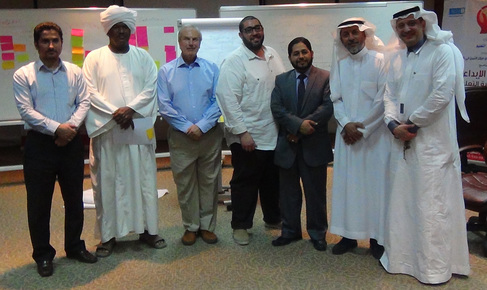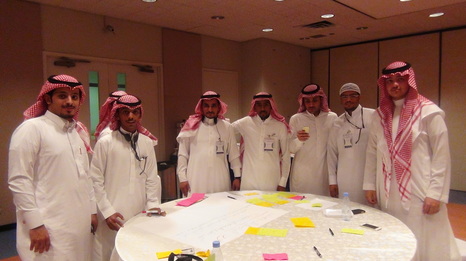November LEARNING ECOLOGIES IN BARCELONA
In November, Lifewide Education Director, Professor Norman Jackson participated in a seminar organised by the e-Learning Centre of the Open University of Catalonia (OuC) at the invitation of the Centre's Director Professor Albert Sangra who is also leading the Centre's Eco4Learn research project. The seminar aimed to share perspectives on the idea of learning ecologies and the ways in which learning ecologies provided a framework for understanding self-determined professional development. The researchers at OuC were particularly interested in the role that ICT can play in expanding the affordances for learning within an individual's learning ecology. Norman was one of four invited international scholars who were working on the idea of learning ecologies and networked scholars.
The Open University of Catalan is the only fully-online University in Europe and in 1994 when it started it was the first university in the world to adopt on-line delivery methods for all of its educational programmes. The e-Learning Centre was formed in 2010 to provide pedagogic support for teachers designing on-line courses. An important reason for the visit was to enable the Centre's Eco4Learn research project team to share the results of their project into the ICT-enabled professional learning ecologies of school teachers to be shared and discussed with the four international scholars.
The seminar itself attracted nearly 50 researchers from different parts of Spain who shared the results of their research on learning ecologies. The edulab research team are planning to publish their results in a book to which Lifewide Education will contribute. The seminar enabled Lifewide Education to share our perspectives on learning ecologies, a subject that we have explored in our magazines, ebook and in a book to be published in January called 'Exploring Learning Ecologies'. It also enabled many informal conversations and new friendships to form and create new opportunities for collaboration.
In November, Lifewide Education Director, Professor Norman Jackson participated in a seminar organised by the e-Learning Centre of the Open University of Catalonia (OuC) at the invitation of the Centre's Director Professor Albert Sangra who is also leading the Centre's Eco4Learn research project. The seminar aimed to share perspectives on the idea of learning ecologies and the ways in which learning ecologies provided a framework for understanding self-determined professional development. The researchers at OuC were particularly interested in the role that ICT can play in expanding the affordances for learning within an individual's learning ecology. Norman was one of four invited international scholars who were working on the idea of learning ecologies and networked scholars.
The Open University of Catalan is the only fully-online University in Europe and in 1994 when it started it was the first university in the world to adopt on-line delivery methods for all of its educational programmes. The e-Learning Centre was formed in 2010 to provide pedagogic support for teachers designing on-line courses. An important reason for the visit was to enable the Centre's Eco4Learn research project team to share the results of their project into the ICT-enabled professional learning ecologies of school teachers to be shared and discussed with the four international scholars.
The seminar itself attracted nearly 50 researchers from different parts of Spain who shared the results of their research on learning ecologies. The edulab research team are planning to publish their results in a book to which Lifewide Education will contribute. The seminar enabled Lifewide Education to share our perspectives on learning ecologies, a subject that we have explored in our magazines, ebook and in a book to be published in January called 'Exploring Learning Ecologies'. It also enabled many informal conversations and new friendships to form and create new opportunities for collaboration.
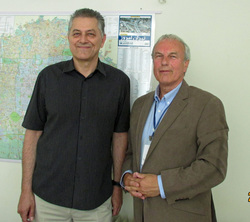
July 2015 VISIT TO OMID E MEHR CENTRE TEHRAN
Once in a while we come across an educational project that is really inspiring. On a recent visit to Iran, Lifewide Education Director, Professor Norman Jackson was invited to visit the
Omid-e-Mehr Centre in Tehran by the Director of the Centre Farhad Behrami (left). The Centre takes in some of the most vulnerable, abused and neglected girls including destitute Afghani refugees. With the help of private donors world wide, the Centre has built a community within which these young women are able to develop the tools, self-awareness, confidence and personal agency they need to lead independent, productive and fulfilled lives.
In a society where being a victim of domestic, violent and/or sexual abuse can bring shame to the victim and their family there is nowhere for girls or young women to turn to. The Omid Foundation was created in 2004 by Marjaneh Halati, a London-based social psychologist and psychotherapist, the foundation now supports nearly 200 girls in two centres. The educational social enterprise is driven by Marjaneh's vision, energy and passion,
Every 6 months the Centre offers places for 30 girls between 15-25. Each girl is interviewed by a psychologist, social worker and psychiatrist and their level of educational attainment is assessed. Those who are offered places are welcomed into a warm, secure, and non-judgemental community in which the women immediately begin to experience what it feels like to have the value of their lives affirmed, and to be treated with respect, dignity, and kindness. Therapeutic intervention ranges from straightforward counseling to more innovative therapeutic approaches which help the girls ‘find their own voice’, discover the their creative talents and develop self-confidence through drama, painting and photography workshops, as well as music, singing and dancing. There is a strong emphasis on personal and creative self-expression and the walls are covered with the artistic expressions of the students.
Once in a while we come across an educational project that is really inspiring. On a recent visit to Iran, Lifewide Education Director, Professor Norman Jackson was invited to visit the
Omid-e-Mehr Centre in Tehran by the Director of the Centre Farhad Behrami (left). The Centre takes in some of the most vulnerable, abused and neglected girls including destitute Afghani refugees. With the help of private donors world wide, the Centre has built a community within which these young women are able to develop the tools, self-awareness, confidence and personal agency they need to lead independent, productive and fulfilled lives.
In a society where being a victim of domestic, violent and/or sexual abuse can bring shame to the victim and their family there is nowhere for girls or young women to turn to. The Omid Foundation was created in 2004 by Marjaneh Halati, a London-based social psychologist and psychotherapist, the foundation now supports nearly 200 girls in two centres. The educational social enterprise is driven by Marjaneh's vision, energy and passion,
Every 6 months the Centre offers places for 30 girls between 15-25. Each girl is interviewed by a psychologist, social worker and psychiatrist and their level of educational attainment is assessed. Those who are offered places are welcomed into a warm, secure, and non-judgemental community in which the women immediately begin to experience what it feels like to have the value of their lives affirmed, and to be treated with respect, dignity, and kindness. Therapeutic intervention ranges from straightforward counseling to more innovative therapeutic approaches which help the girls ‘find their own voice’, discover the their creative talents and develop self-confidence through drama, painting and photography workshops, as well as music, singing and dancing. There is a strong emphasis on personal and creative self-expression and the walls are covered with the artistic expressions of the students.
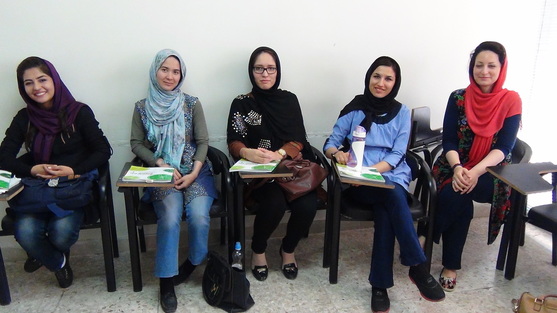
The Centre's educational programmes address three key areas: self-empowerment, education and training. Empowerment is achieved through conselling and a series of workshops that aim to change attitudes through awareness and knowledge. The workshops focus on fostering personal empowerment; the development of a conceptual understanding of individual/human rights; gender identity; a citizen’s role in society; as well as legal issues that pertain to women, the family and the work environment. They further aim to foster the ability to bring about a stable and equitable marital relationships.
Education focuses on developing literary and numeracy skills, with a special emphasis on IT, English language, and creative writing. During our visit we sat in on an English class with four Afghan refugees and were able to ask them questions about their experiences at the Centre. What came across was their appreciation for the opportunity they had and the recognition that it had enabled them to rebuild their lives and build confidence in their own abilities to lead an independent life.
The Centre also seeks to develop cultural awareness and understanding, through visits to places and institutions of cultural merit and 'character' through physical challenges such as climbing significant mountains in the Alborz mountain range north of Tehran.
Assessments are made to either guide the young women towards a university education or advanced professional vocational training in fields such as IT, accounting, secretarial, architectural drafting, or tourism management. Students who opt for the vocational route are placed either in an appropriate job with an Iranian organization or given assistance and mentored to start her own business enterprise. The development of enterprise skills and attitudes is becoming an increasingly important aspect of the programme.
The Centre is keen to provide internships to high school or university students with an Iranian heritage, from America and Europe to contribute to the educational and social process. Those who participate are known as Omid Angels and they teach English or IT, or run yoga classes, drama workshops, fashion design or any other talent they can share.
While giving to charities which support poor people is well established in Iran, supporting social educational enterprises like OMID is not part of the culture. It costs around $400 per month to support a student and all funding is raised through donations and private sponsors. I, and my family, feel privileged, humbled and inspired after our visit to the Omid-e-Mehr Centre. To find out more about the work of the Centre or make a donation you can visit the foundation's website. You might also like to watch ‘The Glass House’, a documentary film which follows the lives of four Iranian women who were members of the first cohort of students
Education focuses on developing literary and numeracy skills, with a special emphasis on IT, English language, and creative writing. During our visit we sat in on an English class with four Afghan refugees and were able to ask them questions about their experiences at the Centre. What came across was their appreciation for the opportunity they had and the recognition that it had enabled them to rebuild their lives and build confidence in their own abilities to lead an independent life.
The Centre also seeks to develop cultural awareness and understanding, through visits to places and institutions of cultural merit and 'character' through physical challenges such as climbing significant mountains in the Alborz mountain range north of Tehran.
Assessments are made to either guide the young women towards a university education or advanced professional vocational training in fields such as IT, accounting, secretarial, architectural drafting, or tourism management. Students who opt for the vocational route are placed either in an appropriate job with an Iranian organization or given assistance and mentored to start her own business enterprise. The development of enterprise skills and attitudes is becoming an increasingly important aspect of the programme.
The Centre is keen to provide internships to high school or university students with an Iranian heritage, from America and Europe to contribute to the educational and social process. Those who participate are known as Omid Angels and they teach English or IT, or run yoga classes, drama workshops, fashion design or any other talent they can share.
While giving to charities which support poor people is well established in Iran, supporting social educational enterprises like OMID is not part of the culture. It costs around $400 per month to support a student and all funding is raised through donations and private sponsors. I, and my family, feel privileged, humbled and inspired after our visit to the Omid-e-Mehr Centre. To find out more about the work of the Centre or make a donation you can visit the foundation's website. You might also like to watch ‘The Glass House’, a documentary film which follows the lives of four Iranian women who were members of the first cohort of students

May 2015 EXPLORING THE RELEVANCE OF LEARNING ECOLOGIES FOR PROFESSIONAL DEVELOPMENT
Professor Norman Jackson facilitated a workshop at the University of Derby on the theme of the ‘Ecology of Learning, Personal and Professional Development’. The session introduced and explored a series of concepts and ideas relating to learning ecologies and the lifewide and networked nature of learning and development activity. Practical workshop activity involved participants in considering and reflection upon their individual learning journeys through life and identifying significant experiences, events and opportunities that have influenced their personal and professional development. Recognising the importance of both positive and negative experiences, and of anticipated and unanticipated events, delegates developed graphical representations of their individual learning journeys in small groups and captured key points in short video presentations.
Professor Norman Jackson facilitated a workshop at the University of Derby on the theme of the ‘Ecology of Learning, Personal and Professional Development’. The session introduced and explored a series of concepts and ideas relating to learning ecologies and the lifewide and networked nature of learning and development activity. Practical workshop activity involved participants in considering and reflection upon their individual learning journeys through life and identifying significant experiences, events and opportunities that have influenced their personal and professional development. Recognising the importance of both positive and negative experiences, and of anticipated and unanticipated events, delegates developed graphical representations of their individual learning journeys in small groups and captured key points in short video presentations.
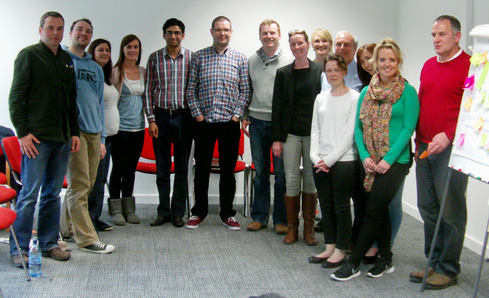
April 2015 CREATIVITY AT THE UNIVERSITY OF LIMERICK
Lifewide Education was invited to facilitate the Scholarly Innovation and Creativity module, on the University of Limerick's, Specialist Diploma in Teaching, Learning and Scholarship programme. The module focuses on everyday creativity and therefore connects in a fundamental way to concepts of lifewide learning and ecologies for learning, development and achievement. The module lasts a day and half and it's something I enjoy doing. Our approach is to develop and facilitate an ecology in which all participants share their perspectives and understandings of creativity in their everyday life and their experiences of encouraging students to use and develop their own creativity.
Lifewide Education was invited to facilitate the Scholarly Innovation and Creativity module, on the University of Limerick's, Specialist Diploma in Teaching, Learning and Scholarship programme. The module focuses on everyday creativity and therefore connects in a fundamental way to concepts of lifewide learning and ecologies for learning, development and achievement. The module lasts a day and half and it's something I enjoy doing. Our approach is to develop and facilitate an ecology in which all participants share their perspectives and understandings of creativity in their everyday life and their experiences of encouraging students to use and develop their own creativity.
FEBRUARY 2015 LIFEWIDE EDUCATION VISITS SAUDI ARABIA
Professor Norman Jackson facilitated two x 2 day professional development events for faculty at King Saud University in Riyadh and a day long event for 40 postgraduate students on themes relating to creativity, lifewide learning and learning ecologies. Both faculty and students expressed interest in these ideas and participated fully in the activities and surveys that were designed to explore and share understandings.
Professor Norman Jackson facilitated two x 2 day professional development events for faculty at King Saud University in Riyadh and a day long event for 40 postgraduate students on themes relating to creativity, lifewide learning and learning ecologies. Both faculty and students expressed interest in these ideas and participated fully in the activities and surveys that were designed to explore and share understandings.
October 2014 LIFEWIDE EDUCATION VISITS CHINA
Lifewide Education's Professor Norman Jackson was invited by Professor Hong Chengwin (second from right) to give a series of lectures on lifewide learning, creativity and the Social Age at Beijing Normal University.
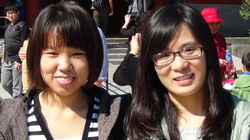
The lectures were well received by interested and enthusiastic postgraduate students studying in the Faculty of Education. Students also participated in a study aimed at revealing how they use social media. Two students Meng Yan (right) and Chen Hui Min have kindly agreed to become lifewide education ambassadors.
